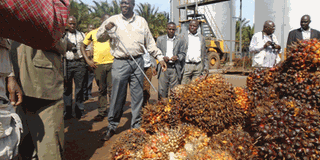3,500 hectares of forest land destroyed for oil palm growing

Demonstration. Kalangala Oil Palm Growers Trust general manager Nelson Basaalidde (in front) demonstrates how oil palm is cultivated at the BIDCO factories in Kalangala District recently. PHOTO BY HENRY LUBULWA
What you need to know:
- Not affected. Ms Lillian Nakaweesi says central forest reserves in the area will not be affected by the project.
Buvuma.
At least 3,500 hectares of private forests in Buvuma District have been earmarked for oil palm growing, an alternative economic activity the farmers in the island district have adopted, Daily Monitor has established.
According to the Resident District Commissioner, Ms Lillian Nakaweesi, the decision to encroach on private forest land was due to the scarcity of farmland in the area.
“But we are not going to cut down existing forests as some people claim, this is private land which was left bare after the owners cleared all the trees,” Ms Nakaweesi said during an interview last week.
“We simply want to make it (land) productive by creating jobs for our people,” she added.
However, Ms Nakaweesi was quick to say the central forest reserves in the area will not be affected as it is the case in Kalangala Islands where many forests have been cut down for palm oil growing.
“We are going to work with National Forestry Authority and National Environment Authority (NEMA) to give out at least 25 tree seedlings to every household so that they plant more trees on the land that will not be used for oil palm growing,” she said.
She added: “We will also take responsibility and plant trees in other areas of Buvuma to recover the already depleted forest cover.”
Buvuma Main Island has about 200 square miles (517km) of land and 26 gazetted forest reserves.
Ms Nakaweesi said the oil palm project has been well received by residents though some are still hesitant to allocate part of their land for oil palm growing.
“We officially kicked off the project on July 1 by clearing some areas in Buwoya Sub-county to set up nursery beds. We had a meeting with the local council chairpersons and landlords last week to help us evict residents still occupying the targeted area,” Ms Nakaweesi said.
She said most of the affected people have been compensated and the Government Chief Valuer will meet the remaining claimants this week.
Although the project is expected to benefit 80,000 residents according Ms Nakaweesi, a total of 10,000 will be displaced.
Buvuma District chairperson Alex Mabirizi said: “Some people bent on failing this project are attempting to illegally repossess land they sold to government while new settlers look at it as idle land which they can grab.”
The Buvuma Palm Oil project is a component of the Vegetable Oil Development Project (VODP) under the Ministry of Agriculture.
A total of 10,000 hectares (25,000 acres) of land, according to Ms Nakaweesi have so far been secured for the project, of which 6,500 acres will be used by Oil Palm Uganda Ltd(OPUL), while 3,500 acres are for out -growers.
OPUL is a subsidiary of Bidco Uganda which already manages oil palm plantations on Bugala Islands in Kalangala District.
Blamed
Recently, environmentalists blamed the disappearing forest cover on the increasing change in land use where large acreage of forest land has been converted into farm land.
“The problem we have in this country is that the politicians only focus on economic benefits of the project forgetting that replacing natural trees with oil palm trees will have fundamental environment implications,” said Mr David Kureeba, the programmes officer, National Association of Professional Environmentalists (Nape).
Mr Kureeba said some oil palm plantations are to be established in central forest reserves.
“Many questions are left unanswered. How can they start such a project before an Environment Impact Assessment is carried out?” he asked
Ms Connie Masaba, the VODP project coordinator, said the project will spur development on the islands as government will invest heavily in sectors such as transport, electricity, among others. “When you look at the benefits, they outweigh the negative effects some conservationists are talking about,” she said.
A section of politicians and conservationists have since 2008 been opposed to the oil palm project in Kalangala, saying it is done at the cost of the environment since many forests have been cut down to pave way for oil palm growing and many small holder farmers were also left landless.
Reported by Jessica Sabano, Dennis Ssebwami % Christopher Kisekka.



